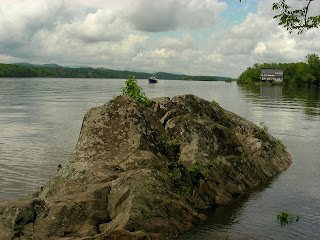I'm reading Mink River, a strange, enchanted, and enchanting first novel by poet and essayist Brian Doyle from Oregon. I was captivated by this (longish) passage about the fictional Mink River in the Pacific Northwest, but it's applicable to your river, too; just change the players.
The river thinks too, you know. Did you think rivers did not think? The Mink is thinking. Salmon and steelhead and cutthroat trout, it thinks. Fir needles. Salmonberries dropping suddenly and being snapped up by a trout who thinks them orange insects. Alder and spruce roots drinking me always their eager thin little rude roots poking at me. Rocks and pebbles and grains of stone and splinters of stone and huge stones and slabs and beaver and mink and crawdads and feces from the effluent treatment plant upriver. Rain and mist and fog and gale and drizzle and howl and owl. Asters and arrow-grass. Finger creeks feeder creeks streams ditches seeps and springs. Rowboats and rafts. Canoes and chicory. Men and women and children. Dead and alive. Willows and beer bottles and blackberry and ducklings and wood sorrel and rubber boots and foxglove and buttercup and rushes and slugs and snails and velvetgrass and wild cucumber and orbweaver spiders and that woman singing with her feet in me singing. Baneberry and beargrass. Thrush and hemlocks and coffee grounds. Thimbleberry and heron. Smelt and moss and water ouzels and bears and bear scat. Bramble and bracken. Elk drinking me cougar drinking me. Ground-cedar and ground-ivy and eelgrass. Vultures and voles. Water striders mosquitoes mosquito-hawks. Dock and dewberry. Moths and mergansers. Huckleberry and snowberry. Hawks and osprey. Water wheels and beaver dams. Deer and lupine. Red currant. Trees and logs and trunks and branches and bark and duff. I eat everything. Elderberry and evening primrose. Bulrush and burdock. I know them all. They yearn for me. Caddis fly and coralroot. I do not begin nor do I cease. Foamflower fleeceflower fireweed. I always am always will be. Lily and lotus. Swell and surge and ripple and roar and roil and boil. I go to the Mother. Madrone and mistmaiden. The Mother takes me in. Nettle and ninebark. Pelt and peppergrass. She waits for me. Pine-sap and poppy. I bring her all small waters. Raspberry and rockcress. I draw them I lure them I accept them. Salal and satin-flower. She is all waters. Tansy and trillium. She drinks me. Velvetgrass and vernalgrass. I begin as a sheen on leaves high in the hills, a wet idea, a motion, a dream, a rune, and then I am a ripple, and I gather the small waters to me, the little wet children, the rills of the hills, and we are me and run to Her muscling through wood and stone cutting through everything singing and shouting roiling and rippling and there She is waiting and whispering her salty arms always opening always open always o.
Bard Rock on the Hudson River at Hyde Park, New York




